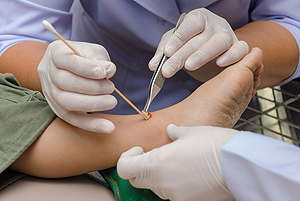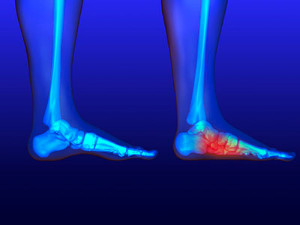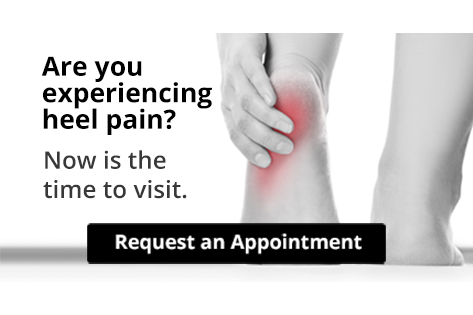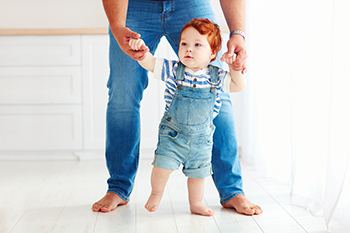Items filtered by date: April 2021
Different Types of Foot Wounds
 Foot wounds are open cuts or sores that form on the feet. There are several different types of foot wounds. Diabetic foot ulcers (DFUs) occur due to diabetes or diabetic neuropathy. They can appear anywhere on the foot, but often appear on the big toes, balls of the feet, and the heels. These wounds typically heal slowly and poorly. Venous stasis ulcers appear on the ankles or legs due to vein damage. Arterial ulcers are caused by arterial insufficiency or poor circulation, and usually occur between or on the tips of the toes and along the outer ankles. A pressure ulcer is caused by foot immobility or by wearing improper shoes. They are usually seen on the heels or ankles. If you have any wounds on your feet, it is strongly suggested that you seek the care of a podiatrist.
Foot wounds are open cuts or sores that form on the feet. There are several different types of foot wounds. Diabetic foot ulcers (DFUs) occur due to diabetes or diabetic neuropathy. They can appear anywhere on the foot, but often appear on the big toes, balls of the feet, and the heels. These wounds typically heal slowly and poorly. Venous stasis ulcers appear on the ankles or legs due to vein damage. Arterial ulcers are caused by arterial insufficiency or poor circulation, and usually occur between or on the tips of the toes and along the outer ankles. A pressure ulcer is caused by foot immobility or by wearing improper shoes. They are usually seen on the heels or ankles. If you have any wounds on your feet, it is strongly suggested that you seek the care of a podiatrist.
Wound care is an important part in dealing with diabetes. If you have diabetes and a foot wound or would like more information about wound care for diabetics, consult with Dr. Kevin Davis from Davis Foot & Ankle Centers. Our doctor will assess your condition and provide you with quality foot and ankle treatment.
What Is Wound Care?
Wound care is the practice of taking proper care of a wound. This can range from the smallest to the largest of wounds. While everyone can benefit from proper wound care, it is much more important for diabetics. Diabetics often suffer from poor blood circulation which causes wounds to heal much slower than they would in a non-diabetic.
What Is the Importance of Wound Care?
While it may not seem apparent with small ulcers on the foot, for diabetics, any size ulcer can become infected. Diabetics often also suffer from neuropathy, or nerve loss. This means they might not even feel when they have an ulcer on their foot. If the wound becomes severely infected, amputation may be necessary. Therefore, it is of the upmost importance to properly care for any and all foot wounds.
How to Care for Wounds
The best way to care for foot wounds is to prevent them. For diabetics, this means daily inspections of the feet for any signs of abnormalities or ulcers. It is also recommended to see a podiatrist several times a year for a foot inspection. If you do have an ulcer, run the wound under water to clear dirt from the wound; then apply antibiotic ointment to the wound and cover with a bandage. Bandages should be changed daily and keeping pressure off the wound is smart. It is advised to see a podiatrist, who can keep an eye on it.
If you have any questions, please feel free to contact one of our offices located in Springfield, and White House, TN, . We offer the newest diagnostic and treatment technologies for all your foot care needs.
Read more about Wound CareDifferent Types of Foot Wounds
 Foot wounds are open cuts or sores that form on the feet. There are several different types of foot wounds. Diabetic foot ulcers (DFUs) occur due to diabetes or diabetic neuropathy. They can appear anywhere on the foot, but often appear on the big toes, balls of the feet, and the heels. These wounds typically heal slowly and poorly. Venous stasis ulcers appear on the ankles or legs due to vein damage. Arterial ulcers are caused by arterial insufficiency or poor circulation, and usually occur between or on the tips of the toes and along the outer ankles. A pressure ulcer is caused by foot immobility or by wearing improper shoes. They are usually seen on the heels or ankles. If you have any wounds on your feet, it is strongly suggested that you seek the care of a podiatrist.
Foot wounds are open cuts or sores that form on the feet. There are several different types of foot wounds. Diabetic foot ulcers (DFUs) occur due to diabetes or diabetic neuropathy. They can appear anywhere on the foot, but often appear on the big toes, balls of the feet, and the heels. These wounds typically heal slowly and poorly. Venous stasis ulcers appear on the ankles or legs due to vein damage. Arterial ulcers are caused by arterial insufficiency or poor circulation, and usually occur between or on the tips of the toes and along the outer ankles. A pressure ulcer is caused by foot immobility or by wearing improper shoes. They are usually seen on the heels or ankles. If you have any wounds on your feet, it is strongly suggested that you seek the care of a podiatrist.
Wound care is an important part in dealing with diabetes. If you have diabetes and a foot wound or would like more information about wound care for diabetics, consult with Dr. Kevin Davis from Davis Foot & Ankle Centers. Our doctor will assess your condition and provide you with quality foot and ankle treatment.
What Is Wound Care?
Wound care is the practice of taking proper care of a wound. This can range from the smallest to the largest of wounds. While everyone can benefit from proper wound care, it is much more important for diabetics. Diabetics often suffer from poor blood circulation which causes wounds to heal much slower than they would in a non-diabetic.
What Is the Importance of Wound Care?
While it may not seem apparent with small ulcers on the foot, for diabetics, any size ulcer can become infected. Diabetics often also suffer from neuropathy, or nerve loss. This means they might not even feel when they have an ulcer on their foot. If the wound becomes severely infected, amputation may be necessary. Therefore, it is of the upmost importance to properly care for any and all foot wounds.
How to Care for Wounds
The best way to care for foot wounds is to prevent them. For diabetics, this means daily inspections of the feet for any signs of abnormalities or ulcers. It is also recommended to see a podiatrist several times a year for a foot inspection. If you do have an ulcer, run the wound under water to clear dirt from the wound; then apply antibiotic ointment to the wound and cover with a bandage. Bandages should be changed daily and keeping pressure off the wound is smart. It is advised to see a podiatrist, who can keep an eye on it.
If you have any questions, please feel free to contact our office located in Springfield, TN . We offer the newest diagnostic and treatment technologies for all your foot care needs.
Heel Pain Can Be Treated!
Heel Pain Can Be Treated!
Flat Feet, Babies, and Adults
 Fallen arches, which are known as flat feet, can affect pregnant women, people who are overweight, or patients who have an abnormal foot structure. There are some patients who can experience pain and discomfort as a result of flat feet. This may be a result of an inflamed tendon on the inside of the foot, or where the arch is normally located. The majority of babies are born with flat feet, and the arch typically develops by adulthood. There are stretches that can be performed which may help to bring mild relief, and this may eliminate the need for surgery. If you have flat feet, and would like information about specific shoes to wear or exercises to perform, please consult with a podiatrist.
Fallen arches, which are known as flat feet, can affect pregnant women, people who are overweight, or patients who have an abnormal foot structure. There are some patients who can experience pain and discomfort as a result of flat feet. This may be a result of an inflamed tendon on the inside of the foot, or where the arch is normally located. The majority of babies are born with flat feet, and the arch typically develops by adulthood. There are stretches that can be performed which may help to bring mild relief, and this may eliminate the need for surgery. If you have flat feet, and would like information about specific shoes to wear or exercises to perform, please consult with a podiatrist.
Flatfoot is a condition many people suffer from. If you have flat feet, contact Dr. Kevin Davis from Davis Foot & Ankle Centers. Our doctor will treat your foot and ankle needs.
What Are Flat Feet?
Flatfoot is a condition in which the arch of the foot is depressed and the sole of the foot is almost completely in contact with the ground. About 20-30% of the population generally has flat feet because their arches never formed during growth.
Conditions & Problems:
Having flat feet makes it difficult to run or walk because of the stress placed on the ankles.
Alignment – The general alignment of your legs can be disrupted, because the ankles move inward which can cause major discomfort.
Knees – If you have complications with your knees, flat feet can be a contributor to arthritis in that area.
Symptoms
- Pain around the heel or arch area
- Trouble standing on the tip toe
- Swelling around the inside of the ankle
- Flat look to one or both feet
- Having your shoes feel uneven when worn
Treatment
If you are experiencing pain and stress on the foot you may weaken the posterior tibial tendon, which runs around the inside of the ankle.
If you have any questions please feel free to contact one of our offices located in Springfield, and White House, TN, . We offer the newest diagnostic and treatment technologies for all your foot and ankle needs.
Read more about Flat FeetFlat Feet, Babies, and Adults
 Fallen arches, which are known as flat feet, can affect pregnant women, people who are overweight, or patients who have an abnormal foot structure. There are some patients who can experience pain and discomfort as a result of flat feet. This may be a result of an inflamed tendon on the inside of the foot, or where the arch is normally located. The majority of babies are born with flat feet, and the arch typically develops by adulthood. There are stretches that can be performed which may help to bring mild relief, and this may eliminate the need for surgery. If you have flat feet, and would like information about specific shoes to wear or exercises to perform, please consult with a podiatrist.
Fallen arches, which are known as flat feet, can affect pregnant women, people who are overweight, or patients who have an abnormal foot structure. There are some patients who can experience pain and discomfort as a result of flat feet. This may be a result of an inflamed tendon on the inside of the foot, or where the arch is normally located. The majority of babies are born with flat feet, and the arch typically develops by adulthood. There are stretches that can be performed which may help to bring mild relief, and this may eliminate the need for surgery. If you have flat feet, and would like information about specific shoes to wear or exercises to perform, please consult with a podiatrist.
Flatfoot is a condition many people suffer from. If you have flat feet, contact Dr. Kevin Davis from Davis Foot & Ankle Centers. Our doctor will treat your foot and ankle needs.
What Are Flat Feet?
Flatfoot is a condition in which the arch of the foot is depressed and the sole of the foot is almost completely in contact with the ground. About 20-30% of the population generally has flat feet because their arches never formed during growth.
Conditions & Problems:
Having flat feet makes it difficult to run or walk because of the stress placed on the ankles.
Alignment – The general alignment of your legs can be disrupted, because the ankles move inward which can cause major discomfort.
Knees – If you have complications with your knees, flat feet can be a contributor to arthritis in that area.
Symptoms
- Pain around the heel or arch area
- Trouble standing on the tip toe
- Swelling around the inside of the ankle
- Flat look to one or both feet
- Having your shoes feel uneven when worn
Treatment
If you are experiencing pain and stress on the foot you may weaken the posterior tibial tendon, which runs around the inside of the ankle.
If you have any questions please feel free to contact our office located in Springfield, TN . We offer the newest diagnostic and treatment technologies for all your foot and ankle needs.
How Pregnancy Affects Your Feet
Weight gain, physiological changes, and hormonal changes can cause problems in the feet during pregnancy. For instance, a growing fetus can put pressure on veins—leading to reduced blood circulation in the feet and swelling. Rapid weight gain can cause arches to collapse as well as pain in the heels and ankles, and bring on corns and calluses from shoes that are now too tight. The release of the hormone relaxin can loosen ligaments in the feet and ankles causing muscles, tendons and ligaments to compensate to support the feet. To alleviate foot pain and discomfort during pregnancy, try elevating the feet and doing low-impact exercises to reduce swelling, wearing larger sized shoes and orthotics to reduce pressure and distribute weight more evenly on the feet, as well as doing daily foot stretches. A podiatrist can suggest proper exercises and footwear, create custom orthotics, treat corns and calluses and otherwise help you maintain proper foot health during your pregnancy.
Pregnant women with swollen feet can be treated with a variety of different methods that are readily available. For more information about other cures for swollen feet during pregnancy, consult with Dr. Kevin Davis from Davis Foot & Ankle Centers. Our doctor will attend to all of your foot and ankle needs.
What Foot Problems Can Arise During Pregnancy?
One problem that can occur is overpronation, which occurs when the arch of the foot flattens and tends to roll inward. This can cause pain and discomfort in your heels while you’re walking or even just standing up, trying to support your baby.
Another problem is edema, or swelling in the extremities. This often affects the feet during pregnancy but tends to occur in the later stages.
How Can I Keep My Feet Healthy During Pregnancy?
- Wearing orthotics can provide extra support for the feet and help distribute weight evenly
- Minimize the amount of time spent walking barefoot
- Wear shoes with good arch support
- Wear shoes that allow for good circulation to the feet
- Elevate feet if you experience swelling
- Massage your feet
- Get regular, light exercise, such as walking, to promote blood circulation to the feet
If you have any questions please feel free to contact one of our offices located in Springfield, and White House, TN, . We offer the newest diagnostic and treatment technologies for all your foot and ankle needs.
Read more about Pregnancy and Foot HealthHow Pregnancy Affects Your Feet
Weight gain, physiological changes, and hormonal changes can cause problems in the feet during pregnancy. For instance, a growing fetus can put pressure on veins—leading to reduced blood circulation in the feet and swelling. Rapid weight gain can cause arches to collapse as well as pain in the heels and ankles, and bring on corns and calluses from shoes that are now too tight. The release of the hormone relaxin can loosen ligaments in the feet and ankles causing muscles, tendons and ligaments to compensate to support the feet. To alleviate foot pain and discomfort during pregnancy, try elevating the feet and doing low-impact exercises to reduce swelling, wearing larger sized shoes and orthotics to reduce pressure and distribute weight more evenly on the feet, as well as doing daily foot stretches. A podiatrist can suggest proper exercises and footwear, create custom orthotics, treat corns and calluses and otherwise help you maintain proper foot health during your pregnancy.
Pregnant women with swollen feet can be treated with a variety of different methods that are readily available. For more information about other cures for swollen feet during pregnancy, consult with Dr. Kevin Davis from Davis Foot & Ankle Centers. Our doctor will attend to all of your foot and ankle needs.
What Foot Problems Can Arise During Pregnancy?
One problem that can occur is overpronation, which occurs when the arch of the foot flattens and tends to roll inward. This can cause pain and discomfort in your heels while you’re walking or even just standing up, trying to support your baby.
Another problem is edema, or swelling in the extremities. This often affects the feet during pregnancy but tends to occur in the later stages.
How Can I Keep My Feet Healthy During Pregnancy?
- Wearing orthotics can provide extra support for the feet and help distribute weight evenly
- Minimize the amount of time spent walking barefoot
- Wear shoes with good arch support
- Wear shoes that allow for good circulation to the feet
- Elevate feet if you experience swelling
- Massage your feet
- Get regular, light exercise, such as walking, to promote blood circulation to the feet
If you have any questions please feel free to contact our office located in Springfield, TN . We offer the newest diagnostic and treatment technologies for all your foot and ankle needs.
Read more about Pregnancy and Foot HealthWhat Kind of Shoes Should My Child Wear?
Since many foot problems in children are due to ill-fitting or improper footwear, it’s important to make sure your child wears the right shoes. Check the fit on their shoes every 3-4 months to make sure they haven’t outgrown them. Avoid shoes that are too inflexible, tight, or hand-me-downs—all of which can change the shape of your child’s feet. Babies learning to walk should be barefoot indoors or have on soft-soled shoes to build up muscles and allow toes to grip the floor. Small children should wear non-synthetic, breathable shoes that are flexible and adjustable for a secure fit with a round toe box. Soles should be smooth and not overly grippy—which can alter a child’s gait and restrict their ability to move properly. If you notice any irregularities in the structure of your child’s foot or their gait, make an appointment with a podiatrist for a full examination.
Making sure that your children maintain good foot health is very important as they grow. If you have any questions, contact Dr. Kevin Davis of Davis Foot & Ankle Centers. Our doctor can provide the care you need to keep you pain-free and on your feet.
Keeping Children's Feet Healthy
Having healthy feet during childhood can help prevent medical problems later in life, namely in the back and legs. As children grow, their feet require different types of care. Here are some things to consider...
Although babies do not walk yet, it is still very important to take care of their feet.
Avoid putting tight shoes or socks on his or her feet.
Allow the baby to stretch and kick his or her feet to feel comfortable.
As a toddler, kids are now on the move and begin to develop differently. At this age, toddlers are getting a feel for walking, so don’t be alarmed if your toddler is unsteady or ‘walks funny’.
As your child gets older, it is important to teach them how to take care of their feet.
Show them proper hygiene to prevent infections such as fungus.
Be watchful for any pain or injury.
Have all injuries checked by a doctor as soon as possible.
Comfortable, protective shoes should always be worn, especially at play.
If you have any questions please feel free to contact one of our offices located in Springfield, and White House, TN, . We offer the newest diagnostic and treatment technologies for all your foot and ankle needs.
Read more about What to Do to Keep Your Child’s Feet HealthyWhat Kind of Shoes Should My Child Wear?
Since many foot problems in children are due to ill-fitting or improper footwear, it’s important to make sure your child wears the right shoes. Check the fit on their shoes every 3-4 months to make sure they haven’t outgrown them. Avoid shoes that are too inflexible, tight, or hand-me-downs—all of which can change the shape of your child’s feet. Babies learning to walk should be barefoot indoors or have on soft-soled shoes to build up muscles and allow toes to grip the floor. Small children should wear non-synthetic, breathable shoes that are flexible and adjustable for a secure fit with a round toe box. Soles should be smooth and not overly grippy—which can alter a child’s gait and restrict their ability to move properly. If you notice any irregularities in the structure of your child’s foot or their gait, make an appointment with a podiatrist for a full examination.
Making sure that your children maintain good foot health is very important as they grow. If you have any questions, contact Dr. Kevin Davis of Davis Foot & Ankle Centers. Our doctor can provide the care you need to keep you pain-free and on your feet.
Keeping Children's Feet Healthy
Having healthy feet during childhood can help prevent medical problems later in life, namely in the back and legs. As children grow, their feet require different types of care. Here are some things to consider...
Although babies do not walk yet, it is still very important to take care of their feet.
Avoid putting tight shoes or socks on his or her feet.
Allow the baby to stretch and kick his or her feet to feel comfortable.
As a toddler, kids are now on the move and begin to develop differently. At this age, toddlers are getting a feel for walking, so don’t be alarmed if your toddler is unsteady or ‘walks funny’.
As your child gets older, it is important to teach them how to take care of their feet.
Show them proper hygiene to prevent infections such as fungus.
Be watchful for any pain or injury.
Have all injuries checked by a doctor as soon as possible.
Comfortable, protective shoes should always be worn, especially at play.
If you have any questions please feel free to contact our office located in Springfield, TN . We offer the newest diagnostic and treatment technologies for all your foot and ankle needs.




